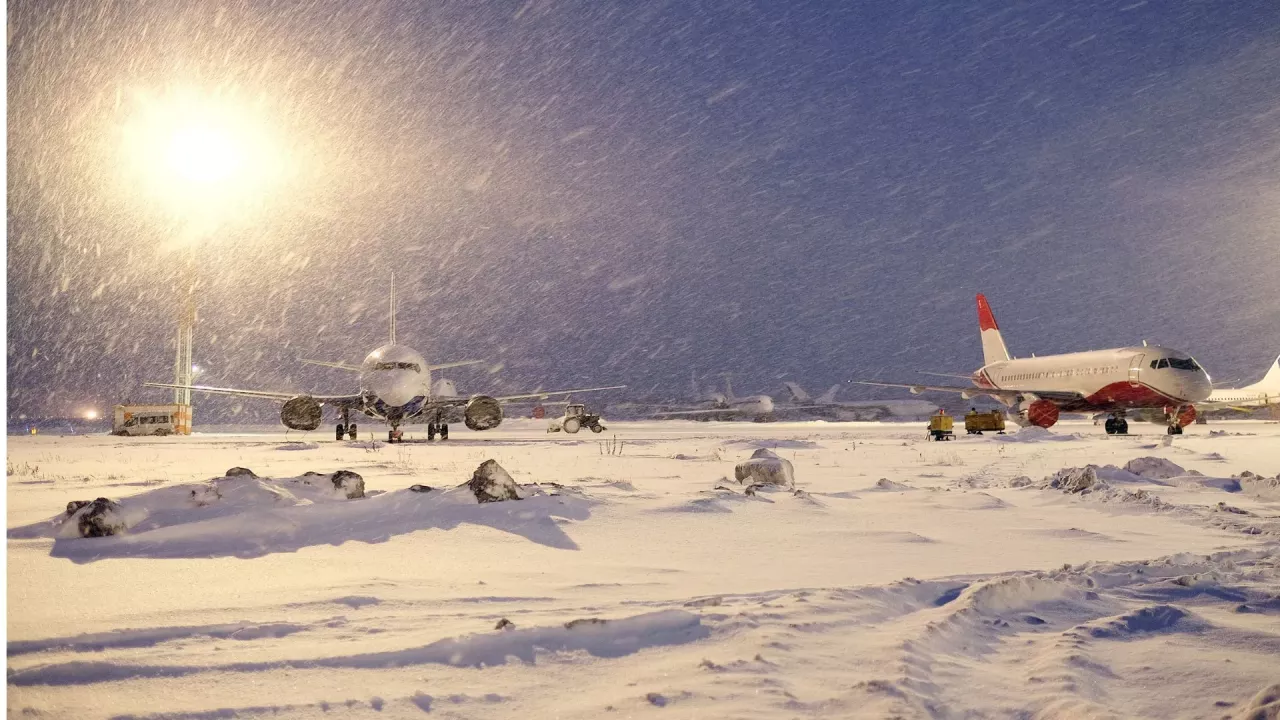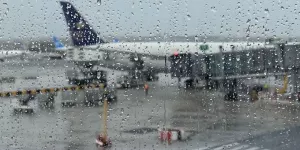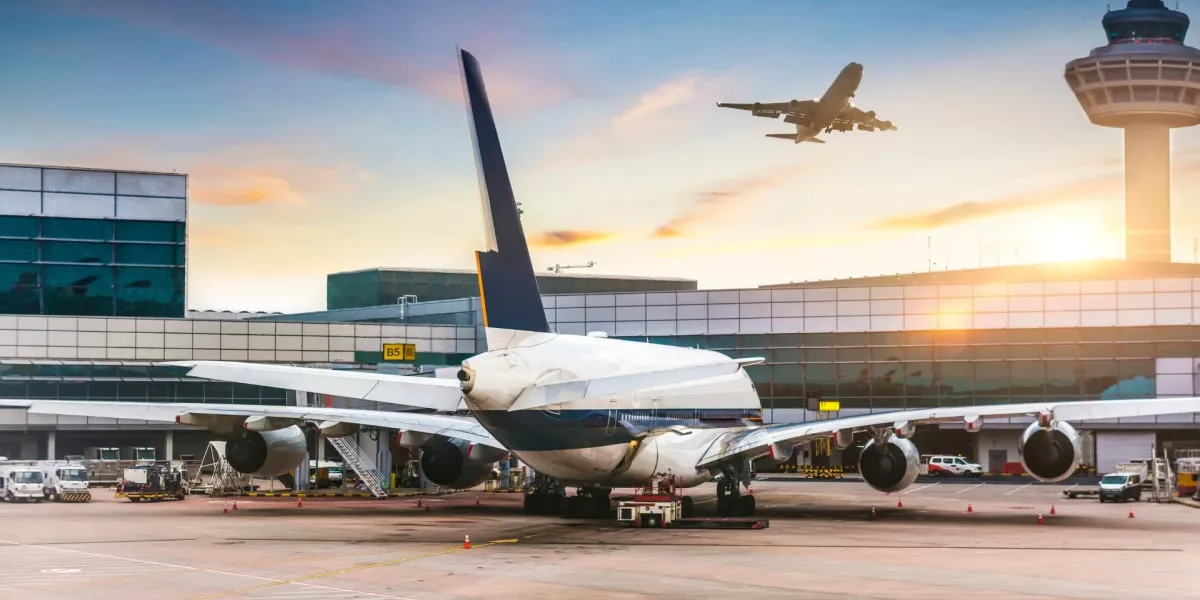When Your Flight is Cancelled Because of Extreme Weather
How many times have you had a flight cancelled because of weather? If you’re like most passengers, you’ve encountered this more than you’d like to. In fact, the Federal Aviation Administration (FAA) says that weather is responsible for 75% of flight disruptions.
Depending on where you’re flying, you could receive airline compensation for cancelled flights, even when they are attributed to weather events, but not always. So, keep reading, because we’re going to explain your rights, what you can expect from the airline, and how to claim compensation for weather-related cancelled flights.
Check compensationWhat is Extreme Weather
Extreme weather is much more serious than a little rain, wind, or snow. Airlines are accustomed to dealing with regular weather patterns, so let’s take a look at what we mean by extreme weather, especially when it affects flights.
Wind
Even though all commercial pilots are trained to handle heavy wind, crosswinds can create big problems during take-off and landing. But it isn’t just wind speed that forces a flight to be cancelled. The decision to cancel flights is made based on several factors such as the crosswind speed, size of the aircraft, the size of the runway, and other meteorological conditions like ice and rain that can make the runway slippery. For this reason, it’s difficult to pinpoint one specific wind speed above which flights are cancelled.
Storms
Storms can pose several different types of problems even though pilots are trained to fly through them, and aircraft are built to withstand most storms. A flight will be cancelled if the storm produces dangerous winds, hail, lightning strikes, windshear, icing, or microbursts. Hail and lightning strikes have the potential to damage planes if they’re strong enough. Windshear (up or downdrafts) can push a plane up or down forcefully which can be especially problematic during take-off and landing. Microbursts are a kind of up or downdraft that can sometimes be stronger than the forward thrust of the aircraft.
Snow
A little bit of snow isn’t a problem, but heavy snow can cause flights to be cancelled. If too much snow accumulates on the body of the aircraft and it cannot be removed by de-icing, then the plane won’t be safe for take-off. The other problem arises when airports can’t clear runways fast enough to accommodate take-off times.
Airports in areas that get significant amounts of snow regularly are usually prepared for these situations, but if a blizzard hits an area where snow isn’t usually seen, then the airport has to scramble to remove snow and ice from the runway. Additionally, de-icing fluid can run low and the staff needed to perform these duties are stretched thin in places where heavy snow is a rarity.
Ice
As with the other weather situations, pilots, aircraft, and airports are all prepared to handle some light ice. Runways can be cleared and planes can be de-iced. But when ice is very heavy and when it is expected to be part of a storm system, flights can be cancelled as a result. At times, ice can be so heavy that it can cause the plane to become too heavy and/or prevent proper airflow over the wings which could lead to it stalling.
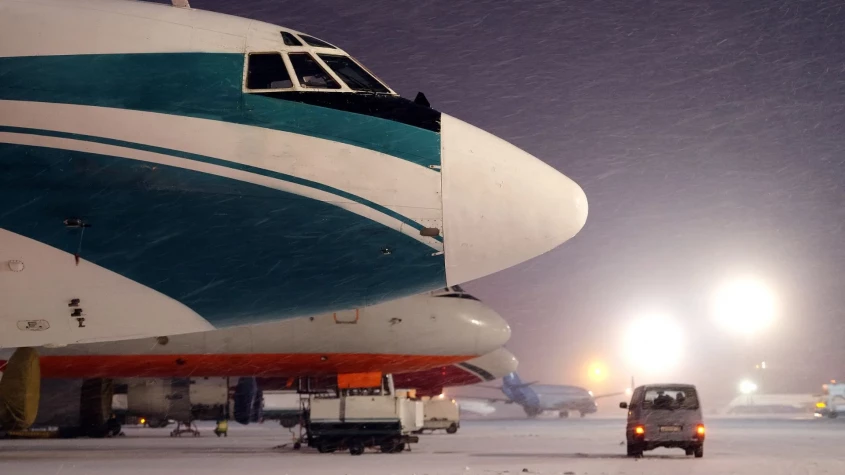
Factors Contributing to Flight Cancellations
Weather-Related Factors
As we touched on above, several factors contribute to an airline’s decision to cancel a flight when weather could pose a safety threat. These include:
- Wind Shear - Either horizontal or vertical, it is defined as the wind speed and/or direction within a certain distance.
- Turbulence - Turbulence can be a safety hazard. In fact, the National Weather Service states that it can “. . . cause overstressing of the aircraft or loss of control. Thunderstorm vertical currents may be strong enough to displace an aircraft up or down vertically as much as 2000-6000 feet”.
- Low Visibility - Even with the advanced technology available on planes today, pilots still need to have a clear view through the windscreen.
Airline Policies and Safety Protocols
When bad weather is looming, several regulatory bodies will assess the situation and then decide if flights should be cancelled. In most cases, the decision is made by air traffic control in combination with the Federal Aviation Administration (FAA). In some places, the airport will also have a say in the policies and procedures of weather-related cancellations. Of course, the safety of passengers and crew are always the top priority in making these decisions.
Airport Operations and Infrastructure
Individual airports have their own policies and procedures for weather cancellations. Again, some airports are not well-equipped to deal with snow and ice while others might not be as regularly affected by high winds or torrential rains. Because of this, de-icing systems and runway clearing machinery may not be available in some locations which can lead to more cancellations when bad weather does occur.
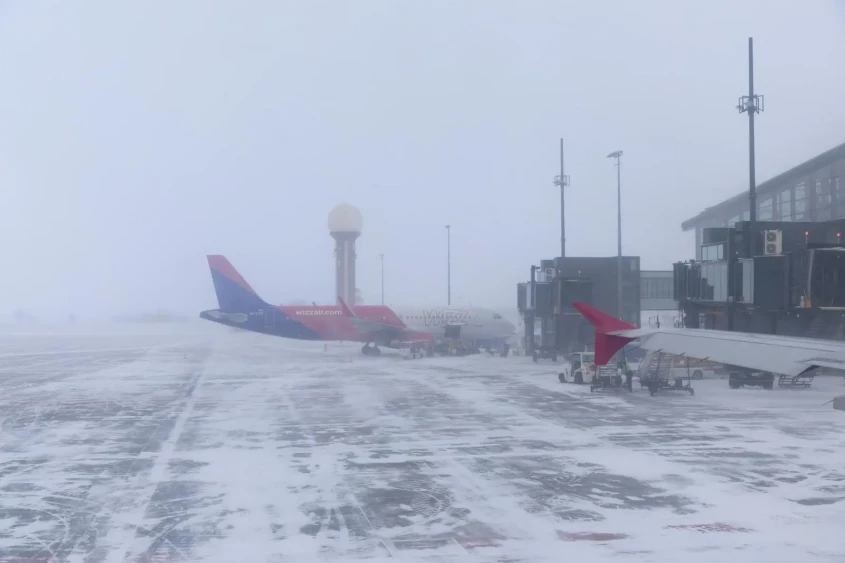
Notable Instances of Flight Cancellations Due to Extreme Weather
Severe Thunderstorms: In June 2023, severe thunderstorms roared through the Mid-Atlantic and Northeast parts of the United States causing over 2,100 to be cancelled.
Winter Weather: In December 2022, a dangerous winter storm with a combination of snow, ice, and wind caused 12,000 flights to be cancelled. The flights included planes travelling into, within or out of the U.S..
Arctic Blast: In January of this year, around 2,515 flights were cancelled in the U.S. because of dangerously low temperatures, ice, and snow.
Air Passenger Rights for Flight Cancellations
If you’re a passenger in the EU, UK, or Canada, you have rights that protect you for flight delays, cancellations, and denied boarding. The regulations in all three regions are very similar and state that airlines are required to compensate passengers for cancelled flights.
They’re also required to either rebook you on the next available flight or give you a full ticket refund as well as provide you with food, refreshments, and accommodation for flights rebooked for the following day.
But there’s a catch.
If the airline can prove that the circumstances causing the cancelled flight were outside their control, then they can avoid the responsibility of paying you compensation. They still have to rebook you on a new flight or give you a refund, but if they can prove that the flight was cancelled because of extraordinary circumstances, then they can escape paying passengers as much as 600 EUR ($650 USD, $885 CAD) for the flight disruption.
Find out if you are owed compensation for a disrupted flight.Check Your Flight
When Weather is an Extraordinary Circumstance
For weather to be considered an extraordinary circumstance, it must be dangerous or severe enough to pose a safety threat. It also must be an unavoidable situation. One example is freezing temperatures and ice.
Airports located in places that typically get plenty of snow and cold during the winter are usually well prepared to handle the challenges that accompany it. So, if an airline cancels a flight because no de-icing fluid was available, then it could be argued that they are responsible for not being fully prepared. The flight will still be cancelled for safety reasons, but the airline can’t claim the situation was due to extraordinary circumstances. Because of situations like this, it’s always worth checking to see if your cancelled flight is eligible for compensation.
Extraordinary weather events
- Dense fog that severely reduces visibility
- Heavy snow
- Extremely high winds
- Dangerous storms
Figuring out how much you are owed for a disrupted flight can be complicated. We're here to help. Let us assess your compensation for you.Check Your Flight
What to do when weather causes a cancellation
As we mentioned above, airlines will sometimes use weather as an excuse to avoid paying compensation. But how do you know when this is the case? If your flight has been cancelled, but you notice other planes arriving and departing, then this might be a sign that your flight might have been able to depart as scheduled.
When you’re notified about the cancelled flight:
- Ask airline staff what caused the cancellation. If they say it was due to weather, then pay attention to other flights to see what’s happening.
- Keep record of their response and what you saw outside and on the information boards, as well as any weather reports you can find for the day because this will all come in handy if you choose to submit a claim.
- Ask for a rebooked flight or a refund if you choose not to continue with your trip.
- Request meal and refreshment vouchers.
- Check to see if your flight is eligible by using our compensation calculator.
To be eligible for cancelled flight compensation
- The cancellation must have happened within the last 3 years for the EU and UK, or the past year for Canada.
- You need to have arrived and checked-in on time.
- Your flight was within the EU or UK, operated by an EU or UK airline, or departing from an EU or UK airport.
- For Canada, your flight must be with a Canadian carrier, or flying to, from, or within Canada.
- You were notified less than 14 days before scheduled departure.
- You reached your final destination 3 or more hours after the original time you were expected to arrive.
How To Get Compensated For Weather-related Cancelled Flights
Say your flight was cancelled because of an ice storm. If you decide to go with the rebooked flight offered by the airline, and you arrive more than 3 hours later than your originally scheduled arrival time, then you can still file a compensation claim. Here’s why.
EU, UK, and Canada regulations also require airlines to compensate you for flight delays. So, even if your original flight was cancelled because of weather or a truly extraordinary circumstance, your rebooked flight could still be eligible for delay compensation if it arrived more than 3 hours late.
Let AirAdvisor Help
If you’re feeling intimidated by the thought of filing a cancelled flight compensation claim with an airline, you’re not alone. That’s where we come in!
Our team of legal professionals have been helping air passengers get the compensation they deserve since 2017, and we’ve filed claims for people all over the globe. We make the claims process easy by handling it all, so you don’t have to. Better still, we only get paid when you do. So, if you’ve had a cancelled flight in the last 3 years, just enter your flight details below to see how much you could be eligible to receive.
Claim with AirAdvisor and get up to €600 ($650) compensation. Find out how much you’re owed today.Check Your Flight
FAQ
Do airlines cancel flights due to weather?
Yes, all the time. It’s actually one of the most common reasons flights are cancelled.
Do airlines compensate for cancelled flights due to weather?
If the weather is severe and unexpected and impacts the airline’s ability to operate the flight safely, no compensation is typically offered. On the other hand, if the cancellation is due to weather that’s common at the departure point or affects your plane in an entirely different location than your departure airport, additional compensation may be possible.
What happens if my flight is cancelled due to weather?
The airline is required to offer you an alternate flight or issue a full refund within 7 days. If the weather isn’t too severe, you may also be eligible to claim compensation for a flight cancelled due to weather.


Flight Compensation Calculator:
Check if you are entitled to flight delay compensation in just 3 minutes.